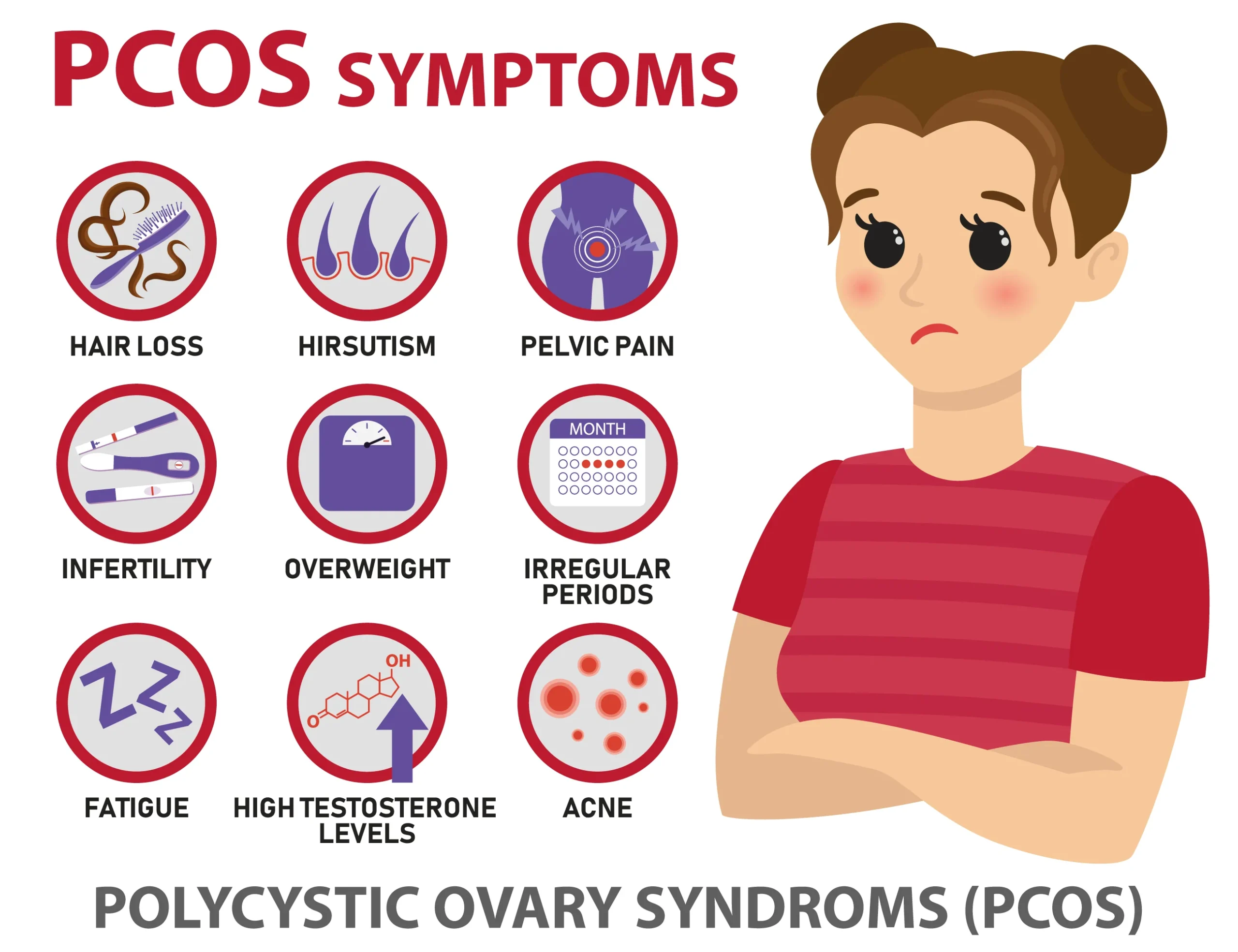
Polycystic Ovarian Disease (PCOD), also known as Polycystic Ovary Syndrome (PCOS), is a common hormonal disorder affecting many girls and women of reproductive age. This condition is characterized by the formation of multiple small cysts in the ovaries, leading to a variety of symptoms and potential complications. Ayurveda, the ancient system of natural and holistic medicine, offers effective treatments for managing PCOD, addressing the root causes and promoting overall well-being.
Symptoms of PCOD
The symptoms of PCOD can vary from person to person, but common signs include:
- Irregular Menstrual Cycles: Infrequent, irregular, or prolonged menstrual periods are a hallmark of PCOD.
- Excess Androgen Levels: Elevated levels of male hormones can result in physical signs such as excess facial and body hair (hirsutism), severe acne, and male-pattern baldness.
- Polycystic Ovaries: Enlarged ovaries containing numerous small cysts that can be detected through an ultrasound.
- Weight Gain: Many girls with PCOD experience difficulty in maintaining a healthy weight.
- Thinning Hair: Hair loss or thinning on the scalp is another common symptom.
- Darkening of Skin: Dark patches of skin, especially in the neck, groin, and under the breasts.
- Skin Tags: Small, excess skin growths in the armpits or neck area.
- Fertility Issues: Difficulty in getting pregnant due to irregular ovulation or failure to ovulate.
Ayurvedic Perspective on PCOD
In Ayurveda, PCOD is considered a result of an imbalance in the doshas (Vata, Pitta, and Kapha), primarily involving Kapha dosha. The imbalance leads to the accumulation of toxins (Ama) in the body, disrupting the natural hormonal balance and menstrual cycle.
Ayurvedic Treatment for PCOD
Ayurveda offers a holistic approach to managing PCOD through a combination of dietary changes, herbal remedies, lifestyle modifications, and detoxification processes. Here are some key Ayurvedic treatments for PCOD:
- Dietary Modifications
- Balancing Doshas: Follow a diet that balances Kapha dosha. Reduce the intake of dairy products, refined carbohydrates, and sugars.
- Include Fresh Fruits and Vegetables: Incorporate plenty of fresh, organic fruits and vegetables into your diet.
- Use Spices Wisely: Spices like turmeric, cinnamon, and ginger can help regulate insulin levels and improve metabolism.
- Herbal Remedies
- Ashwagandha: Known for its adaptogenic properties, Ashwagandha helps reduce stress and balance hormones.
- Shatavari: A powerful herb for female reproductive health, Shatavari supports ovarian function and hormonal balance.
- Turmeric: With its anti-inflammatory and antioxidant properties, turmeric helps manage insulin resistance and reduce inflammation.
- Cinnamon: Helps in regulating menstrual cycles and improving insulin sensitivity.
- Triphala: A traditional Ayurvedic formulation that aids in detoxification and improves digestion.
- Lifestyle Modifications
- Regular Exercise: Engage in regular physical activities like yoga, walking, or swimming to maintain a healthy weight and improve insulin sensitivity.
- Stress Management: Practices like meditation, pranayama (breathing exercises), and mindfulness can help reduce stress and balance hormones.
- Adequate Sleep: Ensure you get 7-8 hours of quality sleep every night to support hormonal health.
- Detoxification (Panchakarma)
- Virechana (Purgation Therapy): Helps in cleansing the body of toxins and balancing the doshas.
- Basti (Medicated Enema Therapy): Effective in removing deep-seated toxins and balancing Vata dosha.
- Yoga and Pranayama
- Yoga Asanas: Specific yoga poses like Bhujangasana (Cobra Pose), Dhanurasana (Bow Pose), and Surya Namaskar (Sun Salutation) can help improve ovarian function and hormonal balance.
- Pranayama: Breathing exercises like Anulom Vilom (Alternate Nostril Breathing) and Kapalbhati (Skull Shining Breath) can help manage stress and improve overall health.
Conclusion
Polycystic Ovarian Disease (PCOD) is a complex condition that requires a comprehensive and holistic approach for effective management. Ayurveda offers a natural and sustainable way to address the root causes of PCOD, balancing the body’s doshas, detoxifying the system, and promoting overall well-being. By incorporating Ayurvedic principles into your lifestyle, you can manage PCOD symptoms effectively and improve your quality of life.
At Dr. Dhruv Ayurveda, we provide personalized Ayurvedic consultations and treatments tailored to your unique constitution and health needs. If you are struggling with PCOD, reach out to us for a holistic and natural approach to healing and wellness.
